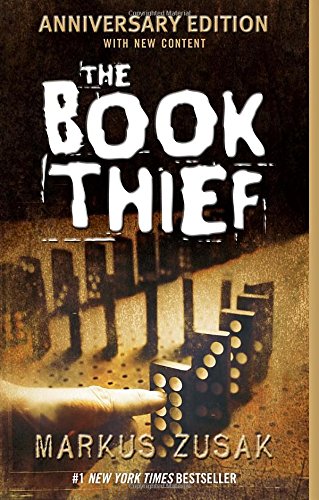All Nonfiction
- Bullying
- Books
- Academic
- Author Interviews
- Celebrity interviews
- College Articles
- College Essays
- Educator of the Year
- Heroes
- Interviews
- Memoir
- Personal Experience
- Sports
- Travel & Culture
All Opinions
- Bullying
- Current Events / Politics
- Discrimination
- Drugs / Alcohol / Smoking
- Entertainment / Celebrities
- Environment
- Love / Relationships
- Movies / Music / TV
- Pop Culture / Trends
- School / College
- Social Issues / Civics
- Spirituality / Religion
- Sports / Hobbies
All Hot Topics
- Bullying
- Community Service
- Environment
- Health
- Letters to the Editor
- Pride & Prejudice
- What Matters
- Back
Summer Guide
- Program Links
- Program Reviews
- Back
College Guide
- College Links
- College Reviews
- College Essays
- College Articles
- Back
The Book Thief by Markus Zusak
The Book Thief is the story of a girl called Liesel who lives in Nazi Germany. Nazi Germany might seem like a strange setting for a story about friendship, humanity and a love for books, but even this place, like any other place in this world, was not devoid of love and compassion. Does that make a difference? Maybe not, but as pointed out in The Word Shaker, at least it creates a different path for those who wish to follow it.
The narrator of this story is Death. Death is fascinated by humans pand their perplexing nature. In his own words,
"I wanted to ask her how the same thing could be so ugly and so beautiful."
The choice of Death as the narrator of this story not only helped in giving a unique perspective about war, death and humanity, but also gave a very important message - not to judge people based on what we hear about them. Of course, this message was more directly given by the portrayal of Max's character, but when Death tells us that he does not have any of the scary characteristics that we often associate with him, I think it was just a more subtle way of giving the same message.
Who would have thought that death would be fascinated by colors, or that he would feel sorry for dying people, or that he would be interested in the story of a girl from a small town in Nazi Germany? The portrayal of Death in this book reminds us about how we form most of our opinions about people and things based on what we hear about them and never even question those opinions.
This book showed the destructive nature of war in a different way. Did people like Hans and Rosa, who gave shelter to a Jew, deserve to die? Did Rudy Steiner, giver of bread, deserve to die? Did Liesel Meminger, the Book Thief, deserve to die? These were all people of Nazi Germany. They 'Heil Hitler'ed when asked to. They were members of the Nazi Party. Some of them even went to fight in the war, and even if they did not agree with the propaganda of the government, they never openly criticised it. There must have been many people like them in Nazi Germany. Their actions and intentions must have gone unnoticed, and many of them must have died in the war.
The characterisation in this book is very good. Even characters who are not central to the story have depth. Frau Holtzapfel, Ilsa Hermann and Michael Holtzapfel are all very well developed characters. These people, like many others, highlighted the grief and pain that people had to go through during those times. Michael Holtazpfel was a soldier in the German army. He served Hitler. He must have killed many people. But still, I found it in me to sympathise with him when I read about everything that he had to go through. This book reminded me again and again that every person I see around me has a story, and has a reason for doing what he does. Every time I judge someone, the lessons that I learned from this book force me to ask myself - If I had been in his shoes, what would I have done? Would I have been brave enough to refuse to do what I was now finding so repugnant?
This book also shed light on the complexity of human nature. It showed the readers that even in times of distress, human beings, especially children, could not help but find happiness and solace in the smallest of things. It showed us that no matter what happens, life goes on. You cannot help but be bothered by the most trivial of things and you cannot help but be overjoyed by the smallest of victories even during a war, because that's how human nature is. A feeling of depression or desolation might be able to overwhelm us for a while, but it can never take absolute control of our lives. Even in the face of grief, we have the ability to show immense courage through our deeds, and people do it everyday.
Similar Articles
JOIN THE DISCUSSION
This article has 0 comments.


The review has spoilers.